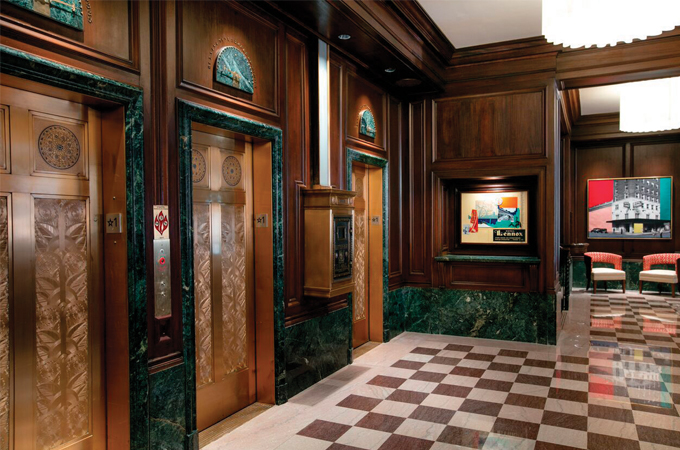st. louis: Many old hotels don’t die, they just fade away, kind of like old soldiers. But some retain their old glory and never disappear … they’ve just got those beautiful ‘old bones’ inside, and add character to a skyline. Such is the case with the newish Courtyard St. Louis Downtown/Convention Center—and yes, you said a mouthful, considering the building came into being in 1929 as the Lennox Hotel at the very end of the Roaring ’20s, on the eve of the Great Depression. It resurfaced a few years ago as the Renaissance, but sputtered within a decade. But now it actually has received a renaissance, to the tune of $15 million, that does justice to this period piece on the National Register. The classy vintage character of the hotel has been retained, to the credit of Maritz, Wolff & Co., which took over the property in 2013. So the reopening in September was truly a cause celebré, and in late October, an exclusive party showed off the period elevator lobby and other fine architectural trappings, like green marble wainscoting around the Beaux-Arts elevator doors and those clock-fashioned brass arrows above that arc to the floor numbers as elevators descend. The place is also replete with a mailbox for envelopes from guests as far away as 25 floors up, who might want to drop them through the slot. (Hmmm … doesn’t anyone just send email anymore?)
In other StL news: The city’s public library has granted amnesty to anyone who has been meaning to ‘get around to …’ returning overdue library books ‘… one of these days.’ For any procrastinators out there, ‘now’ officially means until the very end of the year, Dec. 31 (start date is Dec. 21). Return the books within that upcoming 10-day time slot, and you’re 100 percent fine-free.
creve coeur: Many in the baby boom generation are beginning to lose some boom, which has given rise to retirement buildings that offer them communal living options. Stands to reason that not all seniors have the resources for big rents out-of-pocket, which is where Covenant Place comes in. Located on the Millstone Campus of the Jewish Community Center in Creve Coeur, apartment buildings there have long offered affordable housing to limited-resource seniors. Now the place is getting a major face-lift. The Missouri Housing Development Commission has approved funding for Covenant Place II, part of a three-phase redevelopment project that will replace the existing Covenant House and adjacent apartments. The first building, Covenant Place I, is slated to open in May 2016. The funding, which includes Low-Income Housing Tax Credits, will go toward 102 one-bedroom units as part of phase II. All units will have HUD Section 8 subsidy contracts, making them affordable for lower-income residents. Those eligible for the subsidy pay only one-third of their income, after the deduction of medical expenses, for rent and utilities. The phase II building will feature a community center where residents and seniors from the county will find access to health care, resources and services (including a bank, salon and affordable café), special programs, and a technology/entrepreneur center … so Mark Zuckerberg and all you other dot-com whippersnappers, step aside for the entrepreneurial oldsters at the ‘J’! The total estimated project cost is $85.5 million—with a breakdown for phases I, II and III, respectively at $21.9 million, $28 million and $35. 6 million.
Campus of the Jewish Community Center in Creve Coeur, apartment buildings there have long offered affordable housing to limited-resource seniors. Now the place is getting a major face-lift. The Missouri Housing Development Commission has approved funding for Covenant Place II, part of a three-phase redevelopment project that will replace the existing Covenant House and adjacent apartments. The first building, Covenant Place I, is slated to open in May 2016. The funding, which includes Low-Income Housing Tax Credits, will go toward 102 one-bedroom units as part of phase II. All units will have HUD Section 8 subsidy contracts, making them affordable for lower-income residents. Those eligible for the subsidy pay only one-third of their income, after the deduction of medical expenses, for rent and utilities. The phase II building will feature a community center where residents and seniors from the county will find access to health care, resources and services (including a bank, salon and affordable café), special programs, and a technology/entrepreneur center … so Mark Zuckerberg and all you other dot-com whippersnappers, step aside for the entrepreneurial oldsters at the ‘J’! The total estimated project cost is $85.5 million—with a breakdown for phases I, II and III, respectively at $21.9 million, $28 million and $35. 6 million.
central west end: The cheetah is the world’s fastest land mammal, able to reach 70 mph in a sprint to catch even the swiftest prey. But it cannot outrun the factors that threaten its very survival and have reduced its numbers from 100,000 a century ago to fewer than 10,000 today. The species has become extinct in at least 13 countries where it once had roamed. With this as a backdrop, the Saint Louis Zoo marked International Cheetah Day earlier this month. Kids could make a cheetah mask or try their feet at running that fast. (Nobody did, sorry.) Our zoo is a world leader in cheetah research and captive breeding. Unlike other big cats, the cheetah has very different breeding and behavioral needs. What began as an interest in discovering what makes these animals so selective in choosing a mate has now become an international cooperative effort to link captive breeding programs with research and protection in cheetah range countries. Since 1974, when the zoo opened the Cheetah Survival Center, a facility for research and captive breeding, its cheetah breeding program has successfully raised more than 35 captive-bred offspring. The zoo coordinates its cheetah breeding efforts with other North American zoos as part of a cooperative survival plan, which officials hope will provide suvival for wild populations. In the wild, the zoo’s WildCare Institute Center for Conservation of Carnivores in Africa is focused on developing an effective cheetah census technique, efforts to reduce the animal’s conflict with humans and livestock, conservation of cheetahs outside protected areas, veterinary and health issues, and education programs related to cheetah conservation in Africa. The center has expanded its census and monitoring efforts to include all 35 carnivore species in Tanzania. In addition, it’s teaming up with researchers in Kenya, Botswana, Namibia and South Africa to promote the conservation of cheetahs through research, awareness and community participation. We were surprised to learn that the species is not restricted to Africa; cheetahs also are found in Iran.
The cheetah is the world’s fastest land mammal, able to reach 70 mph in a sprint to catch even the swiftest prey. But it cannot outrun the factors that threaten its very survival and have reduced its numbers from 100,000 a century ago to fewer than 10,000 today. The species has become extinct in at least 13 countries where it once had roamed. With this as a backdrop, the Saint Louis Zoo marked International Cheetah Day earlier this month. Kids could make a cheetah mask or try their feet at running that fast. (Nobody did, sorry.) Our zoo is a world leader in cheetah research and captive breeding. Unlike other big cats, the cheetah has very different breeding and behavioral needs. What began as an interest in discovering what makes these animals so selective in choosing a mate has now become an international cooperative effort to link captive breeding programs with research and protection in cheetah range countries. Since 1974, when the zoo opened the Cheetah Survival Center, a facility for research and captive breeding, its cheetah breeding program has successfully raised more than 35 captive-bred offspring. The zoo coordinates its cheetah breeding efforts with other North American zoos as part of a cooperative survival plan, which officials hope will provide suvival for wild populations. In the wild, the zoo’s WildCare Institute Center for Conservation of Carnivores in Africa is focused on developing an effective cheetah census technique, efforts to reduce the animal’s conflict with humans and livestock, conservation of cheetahs outside protected areas, veterinary and health issues, and education programs related to cheetah conservation in Africa. The center has expanded its census and monitoring efforts to include all 35 carnivore species in Tanzania. In addition, it’s teaming up with researchers in Kenya, Botswana, Namibia and South Africa to promote the conservation of cheetahs through research, awareness and community participation. We were surprised to learn that the species is not restricted to Africa; cheetahs also are found in Iran.
university city: The ACT is one of the final acts for many high school kids. But preparation for the college entrance exam may not just take hours of their time … it can cost a pretty penny too. To make the test, and its ultimate goal (a rewarding college career) possible, the Loop Special Business District and U. City community at large are working together to provide 100 scholarships to University City High School students to recieve lower-cost tutoring from The Princeton Review in preparation for the ACT exams. In 2010, Delmar Loop business owners began the scholarship program by sponsoring three students. Now, the program has grown to support 100. U. City High students who are awarded the scholarships are enrolled in The Princeton Review prep program for ACT exams in April. Talk about raising the bar: Loop businesses have set a $12,000 goal to provide these 100 special scholarships—in addition to the $3,000 the Special Business District already has committed to the program. The course normally costs $600 per student, but the scholarship program has made the tutoring available at only $150 each. To contribute, donations will be collected through Dec. 31. For more information, contact Susan Hill, assistant principal at University City High School.
Photo: Suzy Gorman








